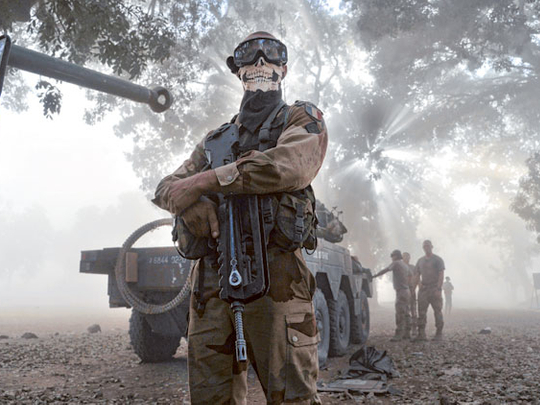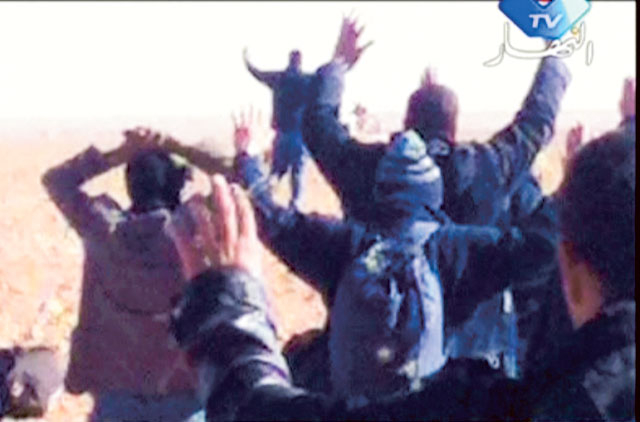
Algiers: Algerian bomb squads searched a gas refinery laced with mines on Monday, looking for more explosive traps a day after the discovery of more bodies throughout the site raised the toll from the terrorist siege well past 80.
Special forces from the Algerian military stormed the plant on Saturday to end the four-day siege, then the government began the painstaking work of finding and defusing the explosives planted in what government officials said was a plot by the Islamic extremists to blow up the complex and kill all their captives.
In a statement, the Masked Brigade, the group that claimed to have masterminded the takeover, warned of more such attacks against any country backing France’s military intervention in neighboring Mali, where the French are trying to stop an advance by Islamic extremists.
“We stress to our Muslim brothers the necessity to stay away from all the Western companies and complexes for their own safety, and especially the French ones,” the statement said.
Algeria said after Saturday’s assault by government forces that at least 32 extremists and 23 hostages were killed. On Sunday, the Algerian bomb squads found 25 more bodies, said a security official, who spoke on condition of anonymity because of the sensitivity of the situation.
“These bodies are difficult to identify. They could be the bodies of foreign hostages or Algerians or terrorists,” the official said.
In addition, a wounded Romanian who had been evacuated died, raising the overall death toll to at least 81.
Two private Algerian TV stations and an online news site said security forces scouring the plant found five militants hiding out on Sunday and learned that three others had fled. That information could not be immediately confirmed by security officials.
“Now, of course, people will ask questions about the Algerian response to these events, but I would just say that the responsibility for these deaths lies squarely with the terrorists who launched a vicious and cowardly attack,” British Prime Minister David Cameron said. Three Britons were killed and another three were feared dead.
On Monday, Philippine Foreign Affairs officials said six Filipinos were among the hostages killed. Spokesman Raul Hernandez told reporters that 16 Filipinos have been accounted for and four others are still missing.
The dead hostages were also known to include at least one American and a French worker. Nearly two dozen foreigners by some estimates were unaccounted for.
It was unclear whether anyone was rescued in the final assault on the complex, which is run by the Algerian state oil company along with BP and Norway’s Statoil.
Authorities said the bloody takeover was carried out Wednesday by 32 men from six countries, under the command from afar of the one-eyed Algerian bandit Moktar Belmoktar, founder of the Masked Brigade, based in Mali. The attacking force called itself “Those Who Sign in Blood” and has claimed to have Canadians in the cell as well.
The Masked Brigade said Sunday the attack was payback against Algeria for allowing over-flights of French aircraft headed to Mali and for closing its long border with Mali. In an earlier communication, the Brigade claimed to have carried out the attack in the name of Al Qaida.
Armed with heavy machine guns, rocket launchers, missiles and grenades, the militants singled out foreign workers at the plant, killing some of them on the spot and attaching explosive belts to others.
Algeria’s tough and uncompromising response to the crisis was typical of its take-no-prisoners approach in confronting terrorists, favoring military action over negotiation. Algerian military forces, backed by attack helicopters, launched two assaults on the plant, the first one on Thursday.
The militants had “decided to succeed in the operation as planned, to blow up the gas complex and kill all the hostages,” Algerian Communications Minister Mohamed Said told state radio.
Norwegian Foreign Minister Espen Barth Eide said the terrorists had tried to blow up the plant on Saturday but managed only to start a small fire. “That’s when they started to execute hostages, and the special forces intervened,” Eide said. Norway’s Statoil said five Norwegians were still missing.
An audio recording of Algerian security forces speaking with the head of the kidnappers, Abdel Rahman al-Nigiri, on the second day of the drama indicated the hostage-takers were trying to organize a prisoner swap.
“You see our demands are so easy, so easy if you want to negotiate with us,” al-Nigiri said in the recording broadcast by Algerian television. “We want the prisoners you have, the comrades who were arrested and imprisoned 15 years ago. We want 100 of them.”
The Algerians’ use of forced raised an international outcry from some countries worried about their citizens.
But French Foreign Minister Laurent Fabius said Sunday on French television: “The terrorists ... they’re the ones to blame.”
David Plouffe, a senior adviser to President Barack Obama, said that al-Qaida and al-Qaida-affiliated groups remain a threat in North Africa and other parts of the world, and that the U.S. is determined to help other countries destroy those networks.
Speaking on “Fox News Sunday,” Plouffe said the tragedy in Algeria shows once again “that all across the globe countries are threatened by terrorists who will use civilians to try and advance their twisted and sick agenda.”
About 200 French infantrymen supported by six combat helicopters and reconnaissance planes advanced Monday toward the town of Diabaly, seized one week ago by Islamic extremists including fighters under the command of the mastermind of Algeria’s recent terror attack.
Diabaly, a small bucolic town in central Mali, has become the scene of the first major battle in the war to retake northern Mali from bearded fighters who have occupied the region for nine months.
“The operation in Diabaly is currently ongoing,” said Capt. Romain, the deputy in charge of France’s 21st Marine Infantry regiment, positioned in the town of Markala about 85 miles (140 kilometers) from the front line.
“We don’t know what we will find there,” he said of Diabaly, giving only his first name in keeping with French military policy.
On the road to Diabaly, there were scenes that indicated the area is returning to normal life. Women washed children in an irrigation canal, others washed clothes and placed them to dry on the banks. Families with suitcases and bags headed north in donkey-drawn carts, apparently returning home after fleeing the conflict.
The French military used fighter planes and helicopter gunships to carry out a dozen operations over the weekend in Mali.
France said it had targeted “terrorist vehicles” in six of the strikes over the last 24 hours, and that the campaign against the militants was making progress.
In an interview with France-5 TV, French Defense Minister Jean-Yves Le Drian said he wasn’t aware of any civilian casualties.
He said the air strikes had caused “significant” - though unspecified - losses among the jihadists, and only minor skirmishes involved French forces on the ground.
Also Sunday, the extremist group behind the deadly hostage crisis in Algeria threatened more attacks against foreign targets if France does not bring an immediate halt to its military operation in Mali.
In a statement, the Masked Brigade warned of more such attacks against any country backing France’s military intervention in Mali.
“We promise all the countries that participated in the Crusader campaign ... that we will carry out more operations if they do not reverse their decision,” it said, according to a transcript released by SITE Intelligence Group.
France began its military offensive in Mali on Jan. 11, and has said that African nations must take the lead though it could be some weeks before they are ready to do so.
On Sunday, France said that some 400 troops from Nigeria, Togo and Benin had arrived Sunday in Bamako to help train an African force for Mali. Troops from Chad, who are considered hardened fighters familiar with the desert-like terrain of northern Mali, also have arrived, Le Drian said.
A top official with the West African regional bloc said Sunday the cost of the African intervention could top $500 million.
ECOWAS Commission President Kadre Desire Ouedraogo, who gave an interview to state television in Ivory Coast, said the initial estimate “may vary depending on the needs” of the mission and the situation on the ground.
About 100 American trainers also have been deployed to Niger, Nigeria, Burkina Faso, Senegal, Togo and Ghana “to discuss training and equipping and deployment needs of those countries in the interest of getting them ready to go into Mali,” said United States State Department spokeswoman Victoria Nuland.
—AP













